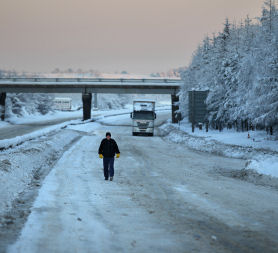UK weather: Army helps clear Edinburgh’s snow
The Army helps clear snow and ice from the streets of Edinburgh – after the city’s heaviest snowfall for almost half a century.

Edinburgh council called in troops to clear roads and pavements, get access to priority sites like doctors’ surgeries and care homes, and help people trapped in their homes get access to food and medical treatment.
Temperatures overnight fell as low as -12 Celsius in central Scotland – and the Met Office warned there was an “ongoing risk of widespread icy roads due to lying snow.”
Driving conditions were particluarly hazardous during the busy morning rush hour – as temperatures in Edinburgh struggled to reach minus nine.
‘Be prepared’
Transport Scotland advised anyone venturing out to be extremely cautious. Chief Inspector Donald McMillan of Central Scotland Police said anyone who didn’t have to travel should stay at home – and motorists who did have to take to the roads should be prepared for any delays by taking a blanket, food and fluids, and making sure their mobile phone was fully charged.
Strathclyde Police said that around 40 per cent of the region’s petrol stations were still suffering fuel shortages, as tankers struggled to deliver supplies – although they expected things to improve during the day.
“Next week the north-easterly winds will bring in the cold weather once more, with an increasing risk of snow showers.” John Hammond, Met Office
Scottish Ministers are meeting representatives from the industry this morning to keep a check on the situation.
Some roads in the worst-hit parts of Scotland have now been re-opened, including the M8 Motorway between Edinburgh and Glasgow – where hundreds of drivers had been stranded for up to two days.
Scottish airports have been bringing in extra de-icing supplies: they said they were more optimistic about today’s flights, although there was still a major risk of disruption.
After days of disruption on the railways, Network Rail said it could still take several hours to defrost carriages brought to a standstill by tonnes of ice – and a number of services remain cancelled or significantly delayed.
De-icing trains
And it’s been revealed that two de-icing trains which help keep the rail network running were sent away for their annual service at the height of the big freeze.
Greg Clark, the Conservative MP for Tunbridge Wells in Kent, said he was told of the move by the managing director of rail operator Southeastern at a meeting yesterday.
“I was flabbergasted to be told by Charles Horton that two of Network Rail’s crucial de-icing trains had been sent away for their annual service at the end of November so were out of action last week.” he said.
“It is farcical that de-icing trains should go in for maintenance in the winter, when they are needed, rather than during the summer, when they are not.”
Network Rail said that it had brought in extra resources from other parts of the network which were not affected by the severe weather.
“These more modern locomotives were able to do much more than the piece of kit that was being upgraded,” said a spokesman.
“We apologise to passengers who faced disruption last week and pay tribute to the Network Rail people and train operator staff who worked 24 hours a day in Arctic conditions to enable the best possible train service to run.”
Brief respite
According to forecasters – there should be a brief respite over the next couple of days, before the icy temperatures return again next week.
In the south, temperatures will remain above freezing today, while Scotland and Northern Ireland could see even milder conditions, up to 9C in some places.
But the Met Office’s John Hammond warned that it won’t last: “Next week the north-easterly winds will bring in the cold weather once more, with an increasing risk of snow showers, especially in northern and eastern parts of the UK.” he said. “It’s going to stay cold for much of the rest of the month with widespread risk of ice, frost and snow showers.”
It’s all left the bookmakers hastily cutting the odds for a White Christmas.